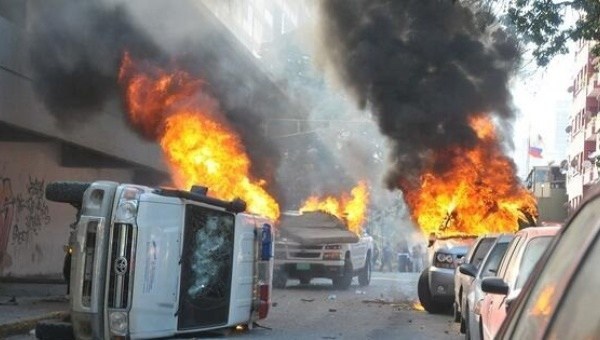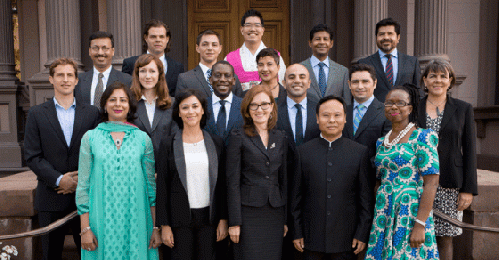
Violence inspired by Popular Will's 'La Salida' campaign (Aporrea)
(Image by File Poto Venezuela Analysis) Details DMCA
The violence led to an arrest warrant for both Lopez and Vecchio on charges of public incitement, property damage, arson, and conspiracy. Lopez was arrested on February 18th, but the street violence of "La Salida" continued until mid-May.
By the end of La Salida, the opposition's campaign of chaos had contributed to the deaths of 49 people, over 800 wounded, and nearly 10 billion dollars in damage.
"La Salida's proposal had a long term vision," Vecchio reflected in his book. "It was a progressive blueprint."
Following Lopez's arrest, Vecchio disappeared for 108 days before resurfacing in the likeliest of places.
From Yale to top dog in Popular WillIn the months leading up to the "La Salida" campaign, Vecchio took a brief sojourn from organizing with Popular Will to attend courses at yet another exclusive East Coast US institution.
This time he was a Maurice R. Greenberg World Fellow at Yale University, joining a program named after the former CEO of the investment mega-bank AIG and Honorary Vice Chair of the Council on Foreign Relations. Just years before, fellow "La Salida" instigator Maria Corina Machado had enjoyed the same fellowship. It was funded by the Open Society Foundation of George Soros, the USAID and NATO-backed German Marshall Fund, and the Rockefeller-founded Asia Society, among others.

Vecchio (second from right, middle row) with the 2013 Maurice Greenberg Yale World Fellows. (Archive)
(Image by File Poto Venezuela Analysis) Details DMCA
In comments made to The Politic, Vecchio said he traveled to New Haven "to see what I can learn" and see how I can apply it to Venezuela, particularly in social innovations, international relations and the role of oil in the international community."
He clearly saw Yale as another step on the way to regime change, remarking, "It also helps to tell people what is going on in my country, and to prepare for the next big steps that need to be taken."
While Vecchio did not elaborate on those so-called "steps," within months of his return to Caracas in December of 2013, Venezuela had descended into political turmoil, Lopez was in prison, and he had decided to go underground. His disappearance sent his former teachers and classmates in New Haven into a state of elevated anxiety.
"Just two months ago, Carlos Vecchio was attending classes and becoming friends with the faculty and students on Yale University's campus," reported Yale's undergraduate paper The Politic on February 20th, 2014. "Now, the former Yale World Fellow finds himself as the target of an arrest warrant in Venezuela."
"We are deeply concerned for Carlos Vecchio's safety: he is currently in hiding in Venezuela with limited access to communication," Yale World Fellows director Michael Cappello fretted.
"This has been primarily a peaceful movement that has tried to work for reform through participation in the political system," added Cappello, a professor of pediatrics and member of the Council on Foreign Relations. "I think it deserves to be celebrated."
In early June 2014, Vecchio resurfaced in New York City. There, he explained in his first interview since leaving Venezuela that Lopez and his peers decided he could best serve the party from abroad.
"They considered that I am most useful in this moment denouncing the abuses which continue to exist against human rights in Venezuela at the international level," he told CNN Espaà �ol, "So we're going to do it."
Next Page 1 | 2 | 3 | 4 | 5 | 6 | 7 | 8 | 9 | 10
(Note: You can view every article as one long page if you sign up as an Advocate Member, or higher).





